Caregiving 101
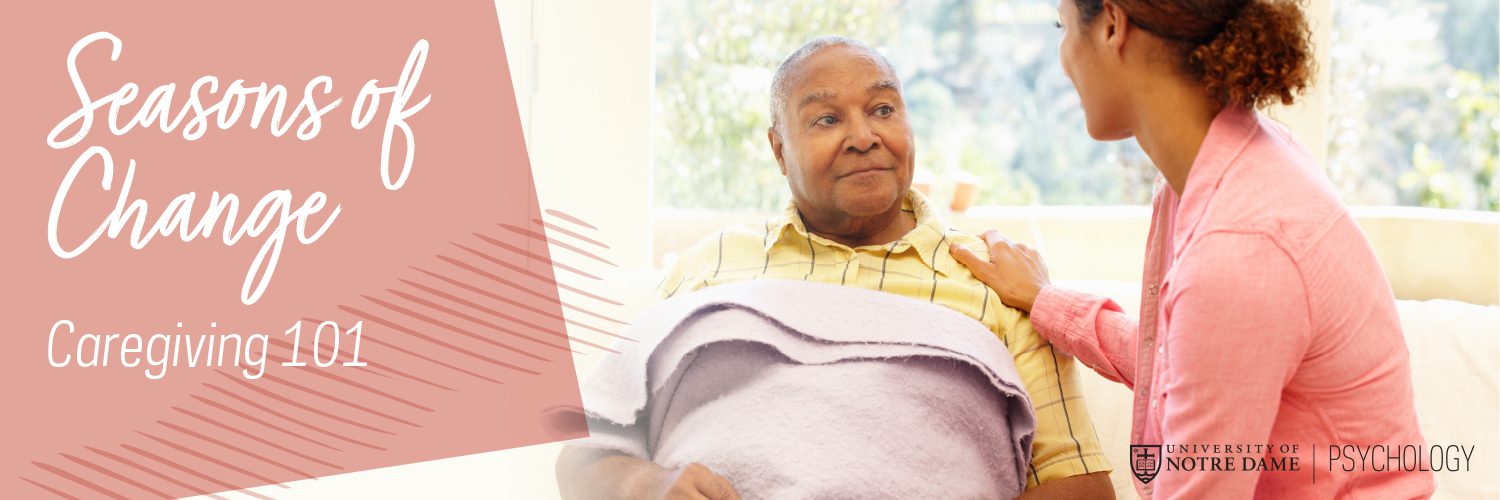
Whether you are new to caregiving or have lots of experience, this live session will give you practical advice about the keys to caring for yourself so you can be there for others. Psychology professor Cindy Bergeman will be joined by neuroscience and behavior professor Nancy Michael in a discussion about first steps for new caregivers, caring alongside siblings or a spouse, how to ask for support, and what resources/skills building caregivers need to know about. They will also discuss what the experience of care-receiving is like, how to understand the ways receiving care from others with grace is a gift to the caregiver and how we strengthen connections with our loved ones through caregiving and care-receiving.
Meet the Faculty: Cindy Bergeman
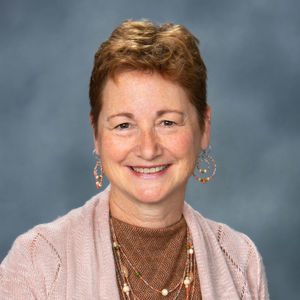
Cindy Bergeman is a professor and chair of the Department of Psychology and an Associate Vice President for Research at the University of Notre Dame. She received her Ph.D. from the Pennsylvania State University in Human Development and Family Studies. Her research investigates the interplay among stress, resilience mechanisms and health and well-being outcomes in young, middle-aged and older adults. The goal of her work is to understand why some individuals age more successfully than others. Her work is funded by multiple research grants from the National Institute of Aging.
Meet the Faculty: Nancy Michael
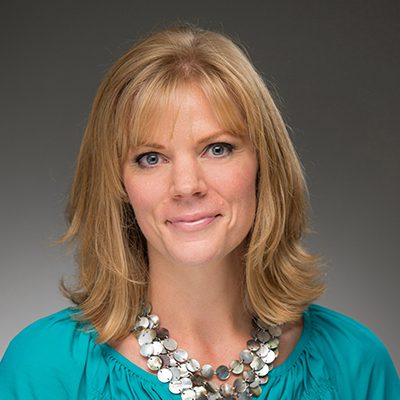
Since December of 2014, Dr. Nancy Michael has served as the Director of Undergraduate Studies for the Neuroscience and Behavior major at the University of Notre Dame. In her few years as faculty, Dr. Michael’s dedication to excellence, innovation in education and commitment to community wellness have earned her numerous teaching, advising and community awards. In partnership with multiple community organizations, Dr. Michael works to develop and implement NEAR (neuroscience, epigenetics, adverse childhood experiences, resilience) science approaches that aim to mitigate the impact of toxic stress on individuals and communities. Her research uses a community-based change theory model to work with community organizations in developing population specific NEAR-based strategies to support organizational and community efforts in becoming trauma-informed.
elevatED: Nancy Michael
“How are we encountering the people in our lives and how are we showing our value for solidarity or our value for common good?” Come along on a developmental journey with Institute for Educational Initiatives Fellow Dr. Nancy Michael, associate teaching professor and director of undergraduate studies in neuroscience and behavior in Notre Dame’s College of Science, in the latest episode of the Institute’s video series elevatED, spotlighting how our faculty, research, and programs raise up the next generation through education.
Watch the rest of the elevatED series here.
The neuroscience of behavioral change: Why intention, attention and persistence matter
The new year is a time when many of us look to change our behaviors in some way. We resolve to be better people, set new goals and seek new ways to improve our lives.
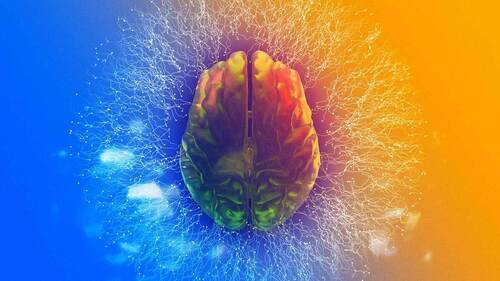
A recent Gallup poll found seven in 10 Americans will kick off 2023 by setting new goals to improve their health, fitness, finances and personal development — and a Forbes Health poll found focusing on mental health to be among the top new year’s resolutions among individuals between the ages of 18 and 25.
Building new or better habits, breaking old ones or committing to a healthier and happier well-being can be difficult — even scary — but it may help to know there’s a secret weapon in all humans specifically designed to embrace change:
The brain.
“Our brains never lose the capacity for change,” said Nancy Michael, the Rev. John A. Zahm, C.S.C., Associate Teaching Professor and director of undergraduate studies in neuroscience and behavior at the University of Notre Dame’s College of Science. “It’s easier when we’re young, during those early years of brain development. As we age, it takes more energy — literally it takes more oxygen and glucose to forge new neural pathways — but the neuroplasticity is still there.”
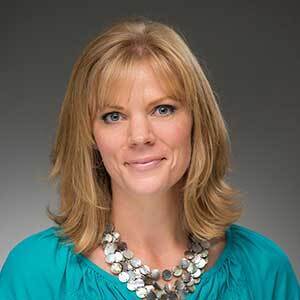
Neuroplasticity is the brain’s ability to change, adapt to and learn new processes. If you remember anything tomorrow that you didn’t know today, Michael said, it’s because you have a physically new structure in your brain that supports the learning, maintenance and recall of new information. “By creating those new structures and learning new things, it allows networks to think and problem solve and integrate information in a completely new way. Over time, it becomes cumulative.”
You may have heard the old saying that a child’s brain is like a sponge. “When we’re young, everything about our brain wants to learn from its environment,” said Michael. “The innate plasticity of neural circuits is high, and demand on metabolic resources is negligible because everything about our cells during early childhood development wants to learn and grow and adapt.”
This common progression of growing, changing and adapting is called synaptic potentiation — a process by which new connections between brain cells are made, Michael explained.
Biologically speaking, as we age, change gets harder. Humans operate along behavioral paradigms, activating the same synapses and circuits they’ve used the most over time. Shifting our response to certain stimuli takes effort.
“That’s why intention, attention and persistence are so important when it comes to changing our behavior,” Michael said. “We have to pay attention in situations in which we know we are likely to fall into bad habits that we would like to change — and we have to be really intentional about persistence and grace and who we want to be.”
Understanding the relationship between stimulus and response can help steer negative responses toward those that are healthier, happier and more positive. But, Michael said, it’s a slow process.
“A lifetime of potentiation of stress eating, for example, doesn’t change just because you understand the mechanism of habits or stress. That’s where intention and attention and persistence come into play. You have to know yourself, your resources, your opportunities, your barriers and triggers, your strengths and what you can build on.”
Michael said all of the work done with students in the classroom and through multiple community engagement initiatives is rooted in those ideas of attention and intention — communicating neuroscience so that everyone understands what all human nervous systems need and expect for wellness.
“We can all do a better job meeting those expectations for ourselves and for the people that are in our lives,” she said.
More from Nancy Michael:
elevatED: Nancy Michael
– Institute for Educational Initiatives
Surprising Ways That Strengthening Your Own Nervous System Can Strengthen Your Community
– Our Universe Revealed
Neuroscience and Behavior for the Common Good
– ThinkND & the Center for Social Concerns
This article was written by Jessica Sieff, assistant director of media relations, and was first published by news.nd.edu on January 31, 2023.
View the Event
Thursday, March 9, 2023 12:00 pm
Whether you are new to caregiving or have lots of experience, this live session will give you practical advice about the keys to caring for yourself so you can be there for others. Psychology Professor Cindy Bergeman will be joined by neuroscience and behavior Professor Nancy Michael in a discussion about first steps for new caregivers, caring alongside siblings or a spouse, how to ask for support, and what resources/skills building caregivers need to know about. They will also discuss what the experience of care-receiving is like, how to understand the ways receiving care from others with grace is a gift to the caregiver and how we strengthen connections with our loved ones through caregiving and care-receiving.
Seasons of Change: Care & Support for Yourself & Others is co-sponsored by Notre Dame Senior Alumni, Notre Dame Women Connect, and the Notre Dame Class of 1983.
View Event